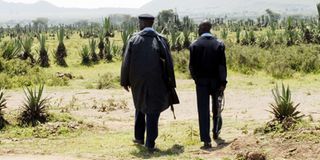No water in Banita ... but who will listen to our cry for help?

Police patrol the barren sisal fields of the Banita Settlement Scheme following skirmishes in 2012.
What you need to know:
- Banita is a small shopping centre west of Nakuru town, and is renowned for both subsistence and commercialised agriculture.
Life was good and farmers had enough water from rivers such as Malewa for irrigating tomatoes and other vegetables.
I look back at my home in Banita in Nakuru County and my heart breaks because of just how much it has lost its beauty and life.
What is remaining is barren land with no water. But first things first. Let me paint you a picture of Banita.
It is a small shopping centre west of Nakuru town, and is renowned for both subsistence and commercialised agriculture.
It is a semi-arid area that hosts one of the largest livestock markets in the county.
Just recently, the market held a goat auction where farmers sold more than 500 goats.
Due to the climate, sisal grows well here and Banita has a sisal factory called the Banita Sisal Estate, which supplies the product to Nakuru County and countrywide.
Water for all
The crop and the factory are also sources of income for many households. I have heard stories from my parents about the history of this agricultural reputation that Banita had.
They tell me that, in those days, there was enough water for all.
Life was good and farmers had enough water from rivers such as Malewa for irrigating tomatoes and other vegetables.
This was enough, and it added to the little rain that Banita receives. However, in the early 1990s, the water was completely redirected.
The few rich people who lived in Banita formed groups to build humongous concrete water tanks, and the water that was freely available to everyone was diverted to certain areas.
Unfortunately, my family lives in the areas that ended up with little or no water.
Due to the water taken to other people, large tracts of land were rendered useless. Small-scale farmers are no longer able to produce the vegetables like they used to.
Scarce commodity
Sisal farming in Banita reduced, even though it is a crop that does not use much water and is always planted in dry areas.
This must tell you just how scarce a commodity water has become.
My parents and other members of the community have raised our concerns to the local authorities about this unfairness but now we have given up because our voices are not heard.
I am writing this article hoping that the Nakuru County government and the concerned national government agencies— especially the Water Resources Authority (WRA) — will intervene and ensure that a resource as basic as water is shared equally amongst the people who live in an area.
Are you aged 10-20 and would like to be Nation’s young reporter? Email your 400-600-word article to [email protected]




